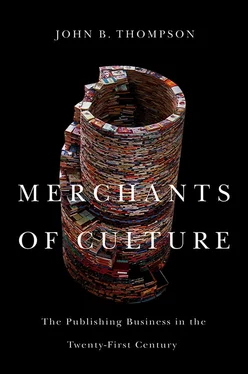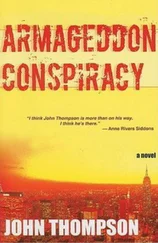By the end of the 1990s, the absorption of Dillons into Waterstone’s had put the newly expanded Waterstone’s in a dominant position in the UK book retail market, but it also marked the beginning of a period of change for the retail giant. HMV’s music stores were very successful at the time, and the management at HMV decided to apply to Waterstone’s some of the retailing principles that had worked so well for the music stores – including a greater emphasis on campaigns and front-of-store promotions, higher stock turn and reducing the range of inventory. It was a model that went against the grain of Tim Waterstone’s conception of bookselling: ‘HMV wanted to go into the mid-market, to reproduce in the book market what they had so brilliantly done in the music market. But it just did not work in books, and I didn’t even want to try it in books,’ he explained. ‘Waterstone’s depends on heavy inventory, it depends on heavy investment in stock, it depends on the quality of its backlist. If you start dragging the inventory out, what you’re doing is dragging out the backlist. And once you start dragging out the backlist, the whole character of the bookselling changes. You’re left with a frontlist, and if you’re left with a frontlist then you’re led into a discount war.’ In 2001 Tim Waterstone resigned as chairman.
In the late 1990s and early 2000s, Waterstone’s also faced threats from new players who entered the market. In 1997 the US-based Borders Group expanded into the UK by acquiring Books Etc.; within five years Borders was operating 37 Books Etc. stores and 21 superstores in the UK and had become one of Waterstone’s major competitors. But the overseas expansion of Borders didn’t last; Borders sold the UK business in 2007, as noted earlier, and all its stores in the UK were closed down in 2009.
The other US-based book retailer who entered the UK market proved to be more resilient. Having acquired the British online bookseller Bookpages in 1998, Amazon quickly expanded its presence in the UK and took a growing share of the market. By 2006 internet booksellers had captured around 11 per cent of the retail book market in the UK – the same share as in the US – and Amazon was overwhelmingly the largest player. While Amazon sells across the whole range of books, it is particularly well suited to selling the more specialized books and older backlist titles, thus eroding the revenue that Waterstone’s and other bricks-and-mortar bookstores were able to generate from backlist sales.
The other set of key players that entered the British retail book market in the late 1990s were the supermarkets – Tesco, Asda and Sainsbury’s. It was the collapse of the Net Book Agreement in the mid-1990s that cleared the way for the entry of the supermarkets into the retail book market. Prior to that, the supermarkets had been largely uninterested in bookselling; the only books they sold were bargain books. The reason was simple. For supermarkets, the ability to compete on price is crucial – it is one of the key ways they are able to secure competitive advantage vis-à-vis other retailers. So long as the Net Book Agreement was in place, the ability to use price as a competitive tool for the sale of books was simply not available to them. However, once the NBA had gone, books became an attractive addition to the non-food mix of the large supermarkets. Part of the strategic aim of large supermarkets like Tesco was to grow non-food to be as strong as food, and non-food ‘can be funerals, it can be garden centres or whatever we’re going into now,’ explained one former buyer for Tesco. ‘Books were seen to be part of entertainment and part of consumer’s disposable income.’ But the supermarkets had to be able to sell the books at prices that were sufficiently low that ‘it’s not considered a purchase any more – it’s, you know, stick it in the basket.’ Once the NBA had collapsed, the supermarkets could negotiate terms with publishers that would enable them to discount heavily and achieve the kinds of prices they felt they needed to make books a ‘stick it in the basket’ good. And books had some additional advantages for the supermarkets. They were one of the few goods that could be returned to the supplier if they didn’t sell, thus protecting the retailer from the risk of being left with lots of unsold stock on the shelves. And they were one of the few products in a supermarket sold with a recommended retail price printed on it, so shoppers could see how much cheaper they were able to buy it at the supermarket.
The supermarkets started with paperbacks, and then three or four years later began to move into frontlist hardcovers and children’s books. So in the course of the late 1990s, a diversified book offering evolved within the supermarkets. The major supermarket chains brought in specialized book buyers who worked at the head offices and were visited regularly by sales reps from the major publishing houses. The buyer’s priority was ‘chart’ – that is, books that were either on, or were likely to make it on to, the paperback or hardcover bestseller lists. The supermarkets watched the bestseller lists produced by newspapers like the Sunday Times but they also produced their own bestseller lists, based on their own sales records. Even the largest supermarket stores had a limited amount of shelf space devoted to books, so the buyer had a small number of slots – maybe six or twelve slots, depending on the store – which could be filled with new titles every two weeks. Titles move up and down the chart and they stay on the shelves so long as they’re selling. If the book continues to sell well it will be kept on the shelves – ‘Something like Martina Cole could be there for eight months.’ But if the sales fall off or are simply too low, the title is pulled out of the stores and returned to the publisher.
The impact of these changes in the retail landscape in Britain in the late 1990s and early 2000s was dramatic. For trade publishers, the changes meant that a declining proportion of their sales was coming through traditional book retail outlets and a growing proportion was coming through non-traditional outlets, especially the supermarkets. This can be seen from table 4, which gives the breakdown of sales by channel for a major UK trade house in 2000 and 2006. In 2000, Waterstone’s and Ottakar’s together accounted for 28 per cent of sales; by 2006, their joint share had fallen to 23 per cent. (In 2006 Waterstone’s bought Ottakar’s; they are grouped together here for both 2000 and 2006 in order to establish a common point of comparison.) WH Smith’s share fell slightly from 13 per cent in 2000 to 12 per cent in 2006. Other chains, including Borders, Books Etc., Blackwell and others, accounted for 11 per cent in both years. Independents’ share fell significantly, from 8 per cent in 2000 to a mere 3 per cent in 2006. Wholesalers fell from 14 per cent to 9 per cent. By contrast, internet sales – and these are overwhelmingly Amazon – rose from 2 per cent in 2000 to 7 per cent in 2006; even these figures probably underestimate the real volume and increase in online retail sales, since Amazon and other online retailers acquire some of their stock from wholesalers. However, the most striking percentages in this table are those indicating sales through the supermarkets, which doubled from 12 per cent in 2000 to 25 per cent in 2006. For this trade house, sales through the supermarkets accounted for a quarter of their sales in 2006, and the supermarkets had overtaken Waterstone’s in terms of sales volume. Moreover, whereas Waterstone’s share was declining over time, the share accounted for by online retail (Amazon) and by the supermarkets was increasing rapidly. These non-traditional outlets were the growth areas for this and other trade publishers, whereas the traditional bricks-and-mortar booksellers were either static or declining as sales channels.
Читать дальше












